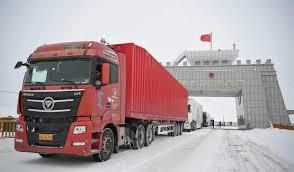As trade relations between China and Pakistan continue to expand under the China–Pakistan Economic Corridor (CPEC), businesses are constantly looking for reliable and affordable ways to move goods across borders. Among all logistics options, Road Freight China to Pakistan has emerged as one of the most cost-effective and flexible solutions for importers and exporters connecting both nations.
This article explores why road freight is becoming the preferred mode of transport between China and Pakistan, its benefits, routes, and how companies can take advantage of affordable freight services to streamline trade operations.
1. The Growing Importance of Road Freight in China–Pakistan Trade
The China–Pakistan Economic Corridor has opened new avenues for economic cooperation. Modern highways, tunnels, and logistics parks have made cross-border trucking more efficient than ever.
Previously, trade between the two countries was dominated by sea freight, which, while cheap for large volumes, often involved long transit times and multiple handling points. Now, with improved road networks like the Karakoram Highway (KKH), road freight allows for faster, door-to-door deliveries — especially beneficial for time-sensitive or medium-sized cargo.
The increased connectivity has made road transport not only faster but also more affordable and accessible to small and medium-sized businesses.
2. Why Road Freight Is an Affordable Choice
There are several reasons why road freight is becoming a budget-friendly logistics option between China and Pakistan:
-
Lower Handling Costs: Goods are loaded directly onto trucks and delivered to the final destination, minimizing storage or port charges.
-
Flexible Load Options: Shippers can choose LTL (Less than Truckload) for smaller shipments or FTL (Full Truckload) for bulk cargo, ensuring cost efficiency.
-
Reduced Transit Time: Shorter routes between western China and northern Pakistan save fuel and reduce transport duration.
-
Customizable Routes: Road freight allows flexible route planning based on the cargo’s origin, helping avoid unnecessary detours or delays.
-
Efficient Border Clearance: The development of Sust Dry Port and streamlined customs procedures have made clearance quicker and smoother.
Overall, road freight strikes the right balance between cost, speed, and reliability, making it ideal for cross-border trade.
3. Key Trade Routes Between China and Pakistan
The main road freight corridor between China and Pakistan runs through the Khunjerab Pass, the highest paved international border crossing in the world.
Primary Route:
Kashgar (China) → Tashkurgan → Khunjerab Pass → Sust Dry Port (Pakistan) → Gilgit → Islamabad → Lahore → Karachi
This route connects China’s Xinjiang region with northern Pakistan and extends down to the country’s major industrial and commercial centers.
The Khunjerab–Gilgit–Islamabad corridor has become the lifeline for logistics under CPEC, enabling year-round trade (except during heavy winter snowfall). Upgrades in road infrastructure and customs facilities have significantly reduced the cost per shipment for logistics operators.
4. Transit Time and Delivery Efficiency
For most shipments, road freight from China to Pakistan offers a transit time of 8–14 days, depending on distance and customs procedures.
-
Kashgar to Islamabad: 6–8 days
-
Kashgar to Lahore: 8–10 days
-
Kashgar to Karachi: 10–14 days
This speed is faster than traditional sea freight (which can take 25–35 days from eastern China), while still being much cheaper than air transport.
For businesses importing electronics, spare parts, or textiles — where every day matters — road freight provides the perfect middle ground between affordability and efficiency.5. Affordable Freight Options for Businesses
Modern logistics providers now offer various customized and affordable road freight services, including:
-
LTL (Less than Truckload): Ideal for smaller shipments that don’t fill a truck, allowing you to pay only for the space you use.
-
FTL (Full Truckload): Cost-effective for bulk cargo, ensuring exclusive vehicle use and faster transit.
-
Door-to-Door Delivery: Eliminates the need for multiple intermediaries, reducing total handling expenses.
-
Consolidation Services: Combine cargo from different clients to share costs and lower freight rates.
DP (Delivered Duty Paid): A hassle-free option where the logistics company handles customs clearance, duties, and final delivery
These flexible solutions make it easier for importers and exporters to manage costs while maintaining a reliable supply chain between China and Pakistan.
6. Cost Factors to Consider
Although road freight is generally affordable, total shipping cost can vary depending on several factors:
-
Cargo Type and Weight
-
Origin and Destination Points
-
Seasonal Conditions (winter closures at Khunjerab)
-
Customs Duties and Documentation Fees
-
Fuel Prices and Tolls
-
Insurance Coverage
Working with an experienced freight forwarder helps optimize routes and negotiate better rates, ensuring cost savings for regular shipments.
7. The Role of CPEC in Reducing Transport Costs
CPEC’s infrastructure projects — including the expansion of the Karakoram Highway, construction of new motorways (M-4, M-5), and development of logistics hubs — have drastically reduced travel time and fuel consumption.
These improvements translate directly into lower freight charges, benefiting businesses on both sides.
Moreover, CPEC’s integrated logistics framework aims to enable 24/7 border operations, digital customs clearance, and cold-chain transport for perishable goods — further enhancing cost efficiency.
8. Partnering with the Right Logistics Provider
Choosing a trusted China–Pakistan road freight company is key to getting affordable and reliable service. Look for providers that offer:
-
Competitive and transparent pricing
-
Real-time shipment tracking
-
Customs clearance support
-
Consolidation and warehousing services
-
Experience with CPEC routes
A well-connected logistics partner ensures that goods move safely and economically from Chinese factories to Pakistani markets.
Conclusion
As China–Pakistan trade continues to expand, road freight stands out as a practical, affordable, and efficient logistics solution. With CPEC infrastructure reshaping connectivity, businesses now have access to cost-effective transport routes that were once unimaginable.
For importers and exporters seeking to balance speed with savings, road freight provides the perfect answer — delivering goods faster, safer, and at a fraction of traditional shipping costs.
By choosing reliable logistics partners and leveraging the CPEC corridor, companies can enjoy seamless, affordable road freight solutions that strengthen trade and boost economic growth across both nations.

Join our community to interact with posts!